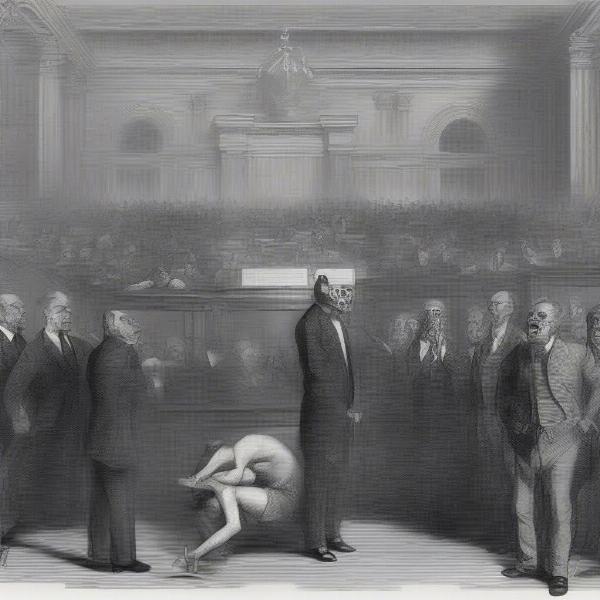In the dystopian world of Panem, depicted in Suzanne Collins’ The Hunger Games trilogy, Avoxes are a chilling reminder of the Capitol’s absolute power and cruelty. They are essentially punished rebels, silenced and forced into servitude. But what exactly does it mean to be an Avox, and why are they such a potent symbol of oppression in this fictional society?
Understanding the Fate of an Avox
Avoxes are individuals who have committed crimes against the Capitol, often acts of rebellion or defiance. Their tongues are cut out, rendering them mute, and they are forced to serve as slaves within the Capitol. They perform menial tasks, acting as waiters, servants, and generally fulfilling the needs of the Capitol citizens. Their silence is a constant reminder of the consequences of disobedience and serves as a warning to anyone who might consider challenging the Capitol’s authority. They are stripped of their identity, their voice, and their past, becoming mere shadows in the opulent world of the Capitol.
The Significance of Avoxes in the Narrative
Avoxes play a crucial role in highlighting the stark contrast between the opulent lives of the Capitol citizens and the oppressed districts. Their presence is a constant, unsettling reminder of the Capitol’s brutality. For Katniss Everdeen, the protagonist, Avoxes represent a personal connection to the consequences of rebellion. She encounters several Avoxes throughout the series, some of whom she knew before their punishment, further emphasizing the personal cost of defiance. This adds a layer of emotional depth to the narrative and strengthens the reader’s understanding of the Capitol’s oppressive tactics.
The Psychological Impact of Silencing
The act of cutting out an Avox’s tongue is not merely a physical punishment; it’s a powerful form of psychological control. By silencing dissenters, the Capitol effectively erases their stories, their perspectives, and their ability to inspire others. This act of silencing represents the Capitol’s attempt to control not only the physical actions of its citizens but also their thoughts and beliefs. The enforced silence of Avoxes creates an atmosphere of fear and discourages any form of opposition.
Why Does the Capitol Create Avoxes?
The Capitol’s motivation for creating Avoxes is multifaceted. It serves as a brutal deterrent against rebellion, a visible and constant reminder of the consequences of disobedience. It also provides a source of readily available, voiceless servants who pose no threat to the Capitol’s power structure. The very existence of Avoxes reinforces the Capitol’s message of absolute control and the futility of resistance.
 Avox Punishment in the Capitol
Avox Punishment in the Capitol
What Happens to Captured Rebels?
Not all captured rebels become Avoxes. The punishment is reserved for those deemed particularly dangerous or whose defiance needs to be made an example of. Others face different forms of punishment, including imprisonment, execution, or being forced to participate in the Hunger Games. The specific fate of a captured rebel depends on the nature of their transgression and the Capitol’s strategic objectives.
Avoxes as Symbols of Resilience
Despite their voicelessness, Avoxes represent a quiet form of resistance. Their very existence is a testament to the human spirit’s capacity for defiance, even in the face of overwhelming oppression. Their silent service, while forced, can be interpreted as an act of enduring strength and a refusal to be completely broken by the Capitol. Their presence serves as a constant, albeit silent, reminder that even the most oppressive regimes cannot entirely extinguish the flame of rebellion.
Do Avoxes Have Any Rights?
Avoxes have no rights. They are considered property of the Capitol and are subject to its whims. Their lives are devoid of agency and freedom, highlighting the dehumanizing nature of the Capitol’s regime. Their lack of rights underscores the stark contrast between the privileged lives of Capitol citizens and the utter powerlessness of those in the districts.
The Broader Themes of Oppression and Resistance
The concept of Avoxes extends beyond the narrative of The Hunger Games. It serves as a powerful metaphor for the silencing of dissent and the suppression of marginalized voices throughout history and in contemporary society. It encourages reflection on the various forms oppression can take and the importance of fighting for freedom of speech and expression.
“The creation of Avoxes serves as a stark reminder of how easily power can corrupt and silence those who dare to challenge it,” notes Dr. Amelia Hawthorne, a leading sociologist specializing in dystopian literature. “Their silent presence is a haunting testament to the human cost of unchecked authority.”
“Avoxes represent the ultimate form of dehumanization, stripped of their voice and identity,” adds Professor David Alder, a historian specializing in totalitarian regimes. “Their fate serves as a cautionary tale about the dangers of complacency in the face of oppression.”
Conclusion: The Unforgettable Silence of Avoxes
Avoxes, though silent, speak volumes about the oppressive nature of the Capitol in The Hunger Games. They are a constant reminder of the consequences of rebellion and the lengths to which the Capitol will go to maintain its control. Their silent suffering highlights the importance of fighting for freedom of speech and resisting oppression in all its forms. Their presence in the narrative adds a layer of depth and complexity to the story, prompting readers to contemplate the true cost of power and the resilience of the human spirit. What are your thoughts on the role of Avoxes in the story? Share your opinions in the comments below!

